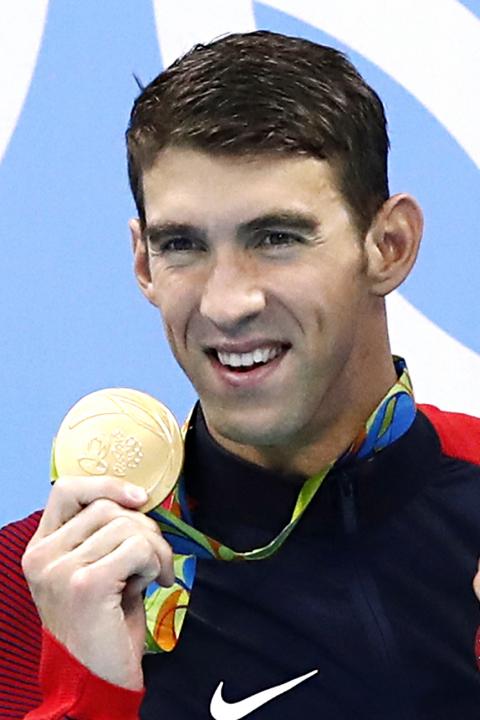The US’ Michael Phelps on Saturday left the Olympic pool for the last time having fulfilled a childhood dream, but it is clear he will not be walking away from the sport that has turned him into a global household name.
Phelps’ swimming career ended with his 23rd gold medal in the 4x100 medley relay medal on Saturday, which extended his record as the most decorated Olympian of all time.
“This all started and began with one little dream as a kid that changed the sport of swimming and tried to do something nobody else has ever done,” Phelps said. “And it turned out pretty cool.”

Photo: AFP
It could have all ended four years ago, a little less cool, for the now 31-year-old American.
After the 2012 London Olympics, which he had declared to be his last, Phelps walked away with not only the regret that he simply went through the motions, but like many athletes in retirement, he appeared lost and unprepared.
In Rio de Janeiro, where he took his Olympic tally to a staggering 28 medals — he also won three silvers and two bronze — it was apparent he was not going through the motions at all.
Clearly exhausted, he shared every victory with the raucous crowd and was especially emotional whenever he caught sight of fiancee Nicole Johnson and infant son Boomer in the stands.
“Getting off the bus walking into the pool tonight I almost felt myself starting to cry,” Phelps said. “Last warmup, last time putting on a suit, last time walking out in front of thousands of people representing my country, it’s insane. A lot better than it was four years ago, this is how I wanted to finish my career. This was the cherry on top of the cake and [I’m] looking forward to starting a new chapter.”
Part of that new chapter now clearly lies outside the pool.
Since he first took the Olympic plunge at the 2000 Sydney Games he has had an ambition to take swimming into the mainstream and there is no doubt the sport has enjoyed a much higher profile during his tenure as its leading figure.
However, it is also apparent he has not been able to elevate it much beyond what it has been — something people only care about during Olympic years and he knows he has work to do.
“I’ve said this to some of you, it’s not done growing,” he told reporters when he qualified for Rio. “In my opinion, and if I have to die before — I’ll go down swinging to see this sport where I want it to be. It’s not done yet.”

The Ministry of Foreign Affairs (MOFA) yesterday said it is closely monitoring developments in Venezuela, and would continue to cooperate with democratic allies and work together for regional and global security, stability, and prosperity. The remarks came after the US on Saturday launched a series of airstrikes in Venezuela and kidnapped Venezuelan President Nicolas Maduro, who was later flown to New York along with his wife. The pair face US charges related to drug trafficking and alleged cooperation with gangs designated as terrorist organizations. Maduro has denied the allegations. The ministry said that it is closely monitoring the political and economic situation

Conflict with Taiwan could leave China with “massive economic disruption, catastrophic military losses, significant social unrest, and devastating sanctions,” a US think tank said in a report released on Monday. The German Marshall Fund released a report titled If China Attacks Taiwan: The Consequences for China of “Minor Conflict” and “Major War” Scenarios. The report details the “massive” economic, military, social and international costs to China in the event of a minor conflict or major war with Taiwan, estimating that the Chinese People’s Liberation Army (PLA) could sustain losses of more than half of its active-duty ground forces, including 100,000 troops. Understanding Chinese

UNRELENTING: China attempted cyberattacks on Taiwan’s critical infrastructure 2.63 million times per day last year, up from 1.23 million in 2023, the NSB said China’s cyberarmy has long engaged in cyberattacks against Taiwan’s critical infrastructure, employing diverse and evolving tactics, the National Security Bureau (NSB) said yesterday, adding that cyberattacks on critical energy infrastructure last year increased 10-fold compared with the previous year. The NSB yesterday released a report titled Analysis on China’s Cyber Threats to Taiwan’s Critical Infrastructure in 2025, outlining the number of cyberattacks, major tactics and hacker groups. Taiwan’s national intelligence community identified a large number of cybersecurity incidents last year, the bureau said in a statement. China’s cyberarmy last year launched an average of 2.63 million intrusion attempts per day targeting Taiwan’s critical

‘SLICING METHOD’: In the event of a blockade, the China Coast Guard would intercept Taiwanese ships while its navy would seek to deter foreign intervention China’s military drills around Taiwan this week signaled potential strategies to cut the nation off from energy supplies and foreign military assistance, a US think tank report said. The Chinese People’s Liberation Army (PLA) conducted what it called “Justice Mission 2025” exercises from Monday to Tuesday in five maritime zones and airspace around Taiwan, calling them a warning to “Taiwanese independence” forces. In a report released on Wednesday, the Institute for the Study of War said the exercises effectively simulated blocking shipping routes to major port cities, including Kaohsiung, Keelung and Hualien. Taiwan would be highly vulnerable under such a blockade, because it